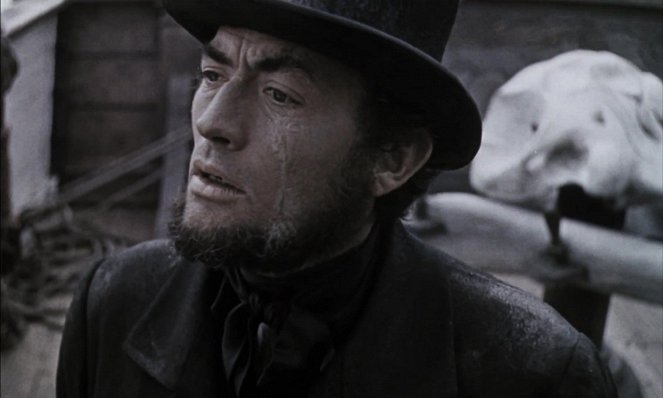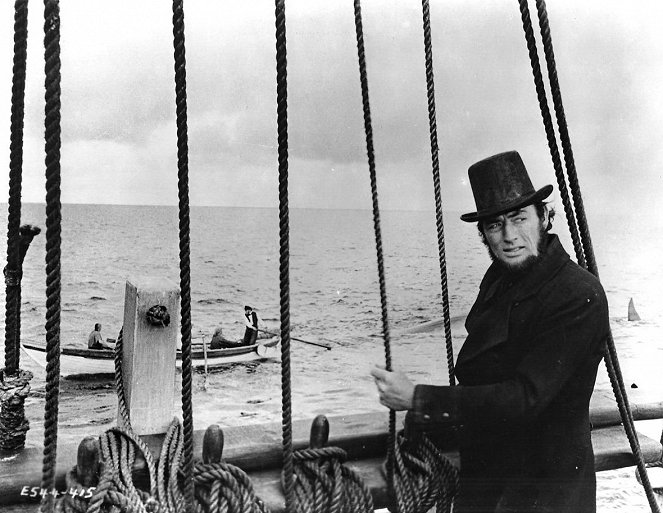Regie:
John HustonKamera:
Oswald MorrisMusik:
Philip SaintonBesetzung:
Gregory Peck, Richard Basehart, Leo Genn, James Robertson Justice, Harry Andrews, Bernard Miles, Francis De Wolff, Royal Dano, Orson Welles, Tom Clegg (mehr)Streaming (1)
Inhalte(1)
Trotz gutgemeinter Warnungen heuern die Seemänner Ishmael (Richard Basehart) und Queequeg (Friedrich von Ledebur) auf dem Walfangschiff ‘Pequod’ an. Dass sie besser darauf gehört hätten, merken die Männer erst auf hoher See: Ahab (Gregory Peck), der Kapitän des Schiffs, ist besessen von der Jagd auf einen weißen Wal namens Moby Dick, den er für den Verlust seines Beines verantwortlich macht. Getrieben von Wut, Hass und Rachegelüsten geht Ahab über Leichen und bringt seine Mannschaft auf der Suche nach seinem Erzfeind Moby Dick mehr als einmal in tödliche Gefahr. (Verleiher-Text)
(mehr)Videos (1)
Kritiken (3)
Alle drei Sterne hat der absolut famose Gregory Peck verdient, ohne den Moby Dick nichts wäre. Wenn man Ahabs verbissenen Gesichtsausdruck sieht und seine donnernde Stimme hört, verzeiht man dem Film auch das, wie veraltet er ist (z. B. im Vergleich zu dem zwei Jahre älteren Werk 20.000 Meilen unter dem Meer, dessen Tricks viel beeindruckender sind). Man sieht auch über die fade Musik und die langwierigen Passagen hinweg.
()
When Melville published the novel "Moby Dick" in the mid-19th century, it was rare for both critics and readers to reject it. The parable of the arrogance of the hunter-prey, who loses his instinct for self-preservation in his pursuit of revenge to such an extent that he causes the destruction of his ship and the entire crew, clashed with the techno-optimism of members of Euro-American civilization, where the concept of humanity as a "conqueror of nature" was prevailing. By the way, the novel is almost unusable today because Melville filled it with a multitude of symbols associated with mythology, Christian faith, and various references to passages from the Bible, which play an important role in the story, and in today's secular times we are no longer able to work with them or decipher the symbolism. For Melville, Moby Dick was actually the embodiment of God himself, and that is very far removed from our thinking. By the way, it is no coincidence that attempts to adapt Melville's literary reference into films are very rare, and Huston's old version stands out as the most impressive. The combination of an adventurous story, philosophical morality, idealized heroism, and realistic description of life on a whaling ship is really more suited to bygone times. Huston's adaptation remains quite faithful to the original and, by the standards of the film industry of the 1950s, it is an ambitious and outstanding work, and thus the film allows Melville's moral positions to be conveyed to today's audience. The technical aspects are understandably a product of their time, and it is particularly evident in the final confrontation with the whale, but a discerning viewer will take that into account. For Gregory Peck, it was a very atypical role, but he performed it with dignity. Overall impression: 80%.
()
If I give a film with Gregory Peck only three stars, it means I was disappointed. It wasn't caused by outdated special effects; the creators did their best back then, and it would be unfair for me to compare their work to what can be achieved with modern technology. My main problem was that I felt like I was in a theater, and I don't want a movie to make me feel this way. I haven't read Herman Melville's novel, and the film didn't give me the urge to do so, which is probably not a good thing. Gregory Peck convincingly portrayed Captain Ahab, haunted by his demons, but from my point of view, he didn't get enough space. Apart from him, the only one who struck me as interesting was Friedrich von Ledebur as Queequeg. The story itself didn't draw me in, but I fully appreciated the bible references. Now I know that if God wanted to become a fish, he would choose to be a mammal. / Lesson learned: If someone tried to kill me for my fat, I would fight back, too. On the other hand, some people pay for having fat sucked out of them.
()



Werbung